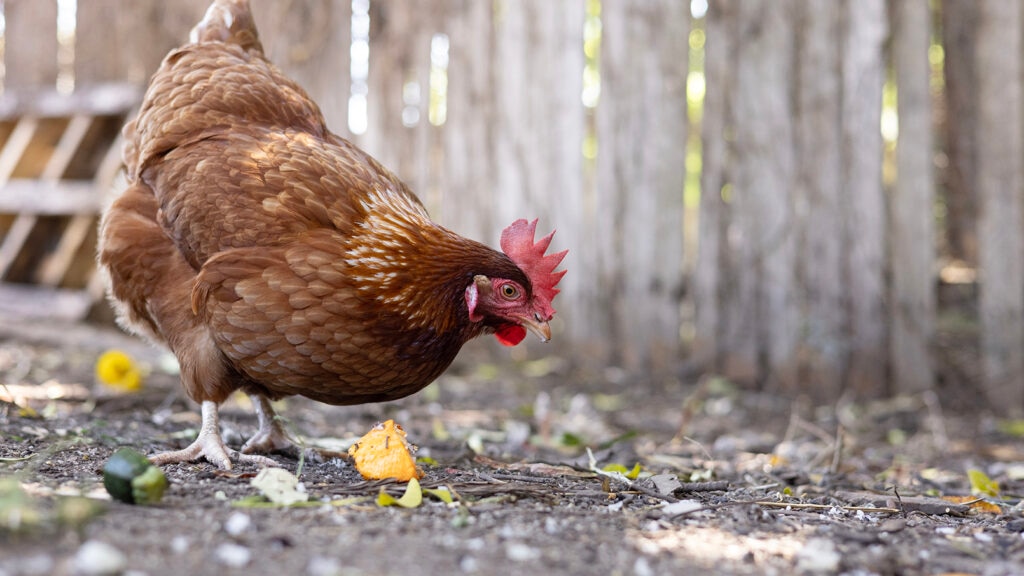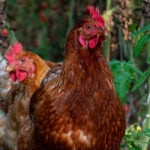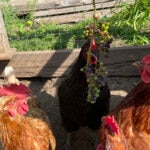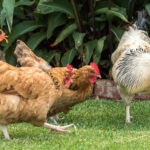Can Chickens Eat Pineapple?

Photo by Kolbz / iStock / Getty Images Plus
The bulk of a chicken’s diet should be a high-quality, balanced layer feed (or grower feed, depending on their age), but these little omnivores also enjoy tasty snacks via fruits and veggies, protein sources such as insects or mealworms, and supplements that promote a happy gut and top-notch eggs.
With so many options, it’s worth asking: Can chickens eat pineapple? This tropical fruit is packed with water and nutrients, but is it a good choice for your flock? Let’s explore.
Before introducing any new food into your chicken’s diet, always check with your veterinarian.
Are Pineapples Good for Chickens?
Though best served in moderation, pineapples are a delicious treat for chickens and have some health benefits, says Lisa Steele, a fifth-generation chicken keeper in Maine and founder of Fresh Eggs Daily. Here are some of the benefits of pineapple she notes:
- The fiber content can promote good digestive health.
- It’s rich in vitamins A, C, and B6, which can help support immune function, metabolism, and vision health.
- It has anti-inflammatory benefits, because it contains bromelain, a group of enzymes that can reduce swelling and support joint health.
- It’s full of antioxidants to combat oxidative stress and promote long-term health.
- The water content is good for hydration, which is especially helpful in hot months.
Are Pineapples Bad for Chickens?
Pineapples aren’t bad for chickens, but they do come with some downsides when eaten in excess—particularly that they can lead to weight gain.
“Pineapples have a very high sugar content and therefore have the same effect as any high-calorie, high-sugar food,” says Katherine Quesenberry, DVM, MPH, DABVP, chief medical officer and service head of avian and exotic pet medicine at the Schwarzman Animal Medical Center in New York. “Too much can lead to excess energy and weight gain.”
Did you know? Chickens become overweight easily with a diet that’s too high in sugar or calories, Dr. Quesenberry notes. When chickens are overweight, this makes them more vulnerable to heat exhaustion, fecal pasting around their butt/vent (pasty butt), and skin and vent (cloacal) infections.
How Much Pineapple Can I Give My Chicken?
As is the case for any treat, pineapples should make up only a very small portion (5%) of your chicken’s diet, with the rest (95%) of the diet consisting of pellets/formulated diets appropriate for the life stage of the chicken, Dr. Quesenberry says.
“If treats are fed in excess of this ratio, then the nutritional content of the diet will be altered, potentially resulting in protein, fat, or trace mineral deficiencies that will affect long-term health and egg laying,” she explains.
Follow this rule of thumb for all treats (pineapple or otherwise):
- Adult chickens: Aim for treats to make up less than 5% (approximately 1 tablespoon) of total food intake per day for adult chickens. Offer treats only in the afternoon to ensure chickens eat their commercial feed first. This prevents treats from replacing essential nutrients.
- Baby chicks: Avoid feeding fruit treats to chicks until they are at least 6–8 weeks old. Their digestive systems are still developing, and they require a balanced starter feed for proper growth.
How To Safely Feed Pineapples to Chickens
Chickens can eat pineapples in moderation, but make sure to prepare the fruit ahead of time. Here’s how:
- Cut the pineapple into bite-size pieces. “Chickens need pieces small enough to easily swallow,” says Dr. Quesenberry. “Removing the rind or core is not necessary, as these parts will pass through the gizzard and be ground down or eliminated in the feces.”
- Feed in moderation. Offer only a small amount in the afternoon to prevent digestive upset and to ensure it doesn’t replace their layer feed.
- Remove any uneaten fruit after 15–20 minutes. Uneaten fruit becomes a breeding ground for flies and insects. It also can rot and become a source of unhealthy bacteria.
My Chicken Ate Too Much Pineapple—What Do I Do?
Generally, eating too much pineapple as a one-time treat is unlikely to cause serious harm. The bigger concerns—such as obesity and nutritional imbalances—occur when chickens are regularly overfed treats instead of their balanced diet.
A chicken might experience the following symptoms if they eat too much pineapple:
- Loose stool
- Irritated mouth (from the enzymes)
In most cases, these effects are short-lived and not harmful, as long as your chicken gets back to their normal eating and behavior within a day.
Consult an avian vet if you notice the following more severe symptoms, which could indicate a bigger issue:
- Persistent diarrhea
- Lethargy
- Refusal to eat
What Other Fruits Can Chickens Eat?
Fruit is a tasty treat for your chickens, as long as it makes up only a small portion of their diet. Here are some other fruits chickens can eat:
- Strawberries: Packed with antioxidants and vitamin C
- Bananas: A soft, easy-to-eat treat rich in potassium, fiber, and B vitamins
- Apples (without seeds): A crunchy, fiber-rich treat that promotes digestion
- Watermelon: Hydrating, refreshing, and low in sugar
- Blueberries: Full of antioxidants that support immune health
FAQs About Pineapple for Chickens
Q: Can baby chicks eat pineapple?
A: Do not feed pineapple to baby chickens. Their digestive systems aren’t fully developed, and pineapple might be difficult for them to digest. They also should rely heavily on a balanced starter feed for healthy growth.
Q: Can chickens eat pineapple skin? Can chickens eat pineapple core?
A: Yes, chickens can eat pineapple skin and pineapple core. These are fibrous parts of the fruit that are digested and passed by chickens.
Q: Can chickens eat dried pineapple?
A: Dried pineapple is OK for chickens to eat. However, note that prepackaged dried pineapple often contains additional ingredients, including extra sugar and preservatives. Dried pineapple is also lacking water content.
Q: Are any fruits poisonous to chickens?
A: Some fruits are toxic to chickens, including avocados (the entire fruit) and rhubarb. Citrus fruits can affect calcium absorption and potentially affect eggshell quality. Fruit seeds from apples, pears, and cherries contain cyanide. Also note that while ripe tomatoes are OK, unripe tomatoes can be harmful.
Attributions
This content was medically reviewed by Molly Price, DVM, Chewy veterinarian.




